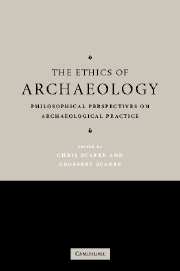Book contents
- Frontmatter
- Contents
- List of contributors
- Acknowledgements
- 1 Introduction
- PART I THE OWNERSHIP OF CULTURAL OBJECTS
- 2 Cultures and the ownership of archaeological finds
- 3 Who guards the guardians?
- 4 Is culture a commodity?
- 5 Moral arguments on subsistence digging
- PART II ARCHAEOLOGISTS AND THE LIVING
- PART III ARCHAEOLOGISTS AND THE DEAD
- PART IV THE COMMON HERITAGE OF HUMANKIND?
- References
- Index
2 - Cultures and the ownership of archaeological finds
Published online by Cambridge University Press: 05 June 2012
- Frontmatter
- Contents
- List of contributors
- Acknowledgements
- 1 Introduction
- PART I THE OWNERSHIP OF CULTURAL OBJECTS
- 2 Cultures and the ownership of archaeological finds
- 3 Who guards the guardians?
- 4 Is culture a commodity?
- 5 Moral arguments on subsistence digging
- PART II ARCHAEOLOGISTS AND THE LIVING
- PART III ARCHAEOLOGISTS AND THE DEAD
- PART IV THE COMMON HERITAGE OF HUMANKIND?
- References
- Index
Summary
The question of who ought to own the artefacts archaeologists find has generated a vast literature. Lawyers, archaeologists, anthropologists, museum curators, aboriginal rights activists and others have written extensively on the question of who has a right to archaeological finds. This literature has been part of the larger literature concerned with cultural appropriation. With very few exceptions, philosophers have had nothing to say about the appropriation of archaeological finds. This is unfortunate since ethical questions lie at the root of the legal and public policy debates about ownership of archaeological finds. This chapter is designed to provide the ethical framework required for the resolution of some of these debates. I am particularly interested in the suggestion that a culture can have a claim on archaeological finds. My hypothesis is that, some of the time, a culture has a rightful claim on archaeological finds.
CANDIDATE OWNERS
At least four types of candidates can be identified as possible rightful owners of archaeological finds. The first possible owners of find are individuals. These individuals could be either individual people or institutions such as museums. Individual owners could be those who have found artefacts or those who have fairly acquired them from the individuals who have. Alternatively, a find might be owned by a culture. So, for example, one might hold that some find belongs to the members of Greek culture. One also hears the suggestion that archaeological finds are part of the patrimony of a nation.
- Type
- Chapter
- Information
- The Ethics of ArchaeologyPhilosophical Perspectives on Archaeological Practice, pp. 15 - 31Publisher: Cambridge University PressPrint publication year: 2006
- 11
- Cited by



